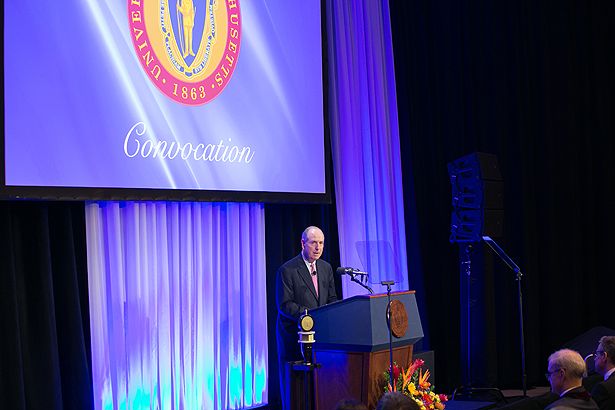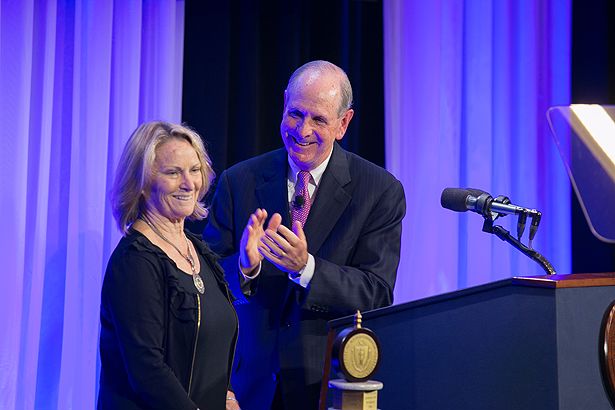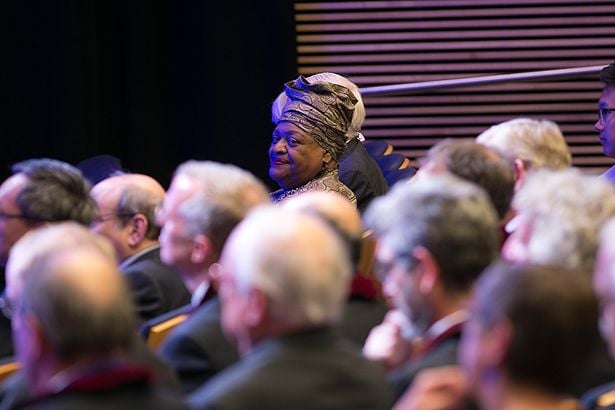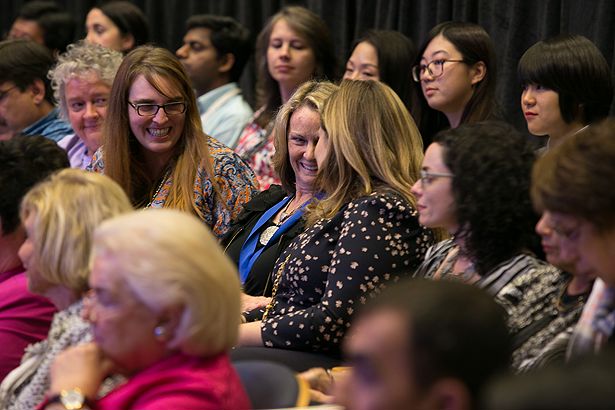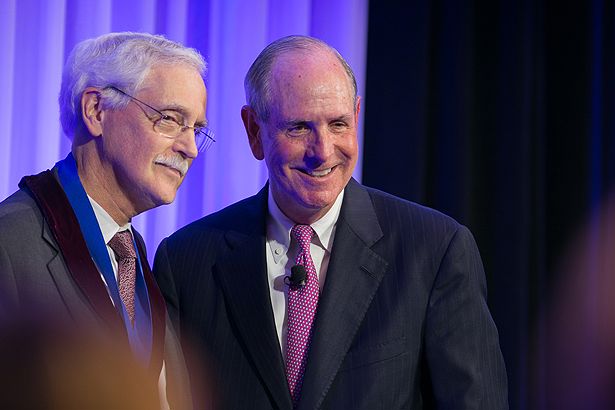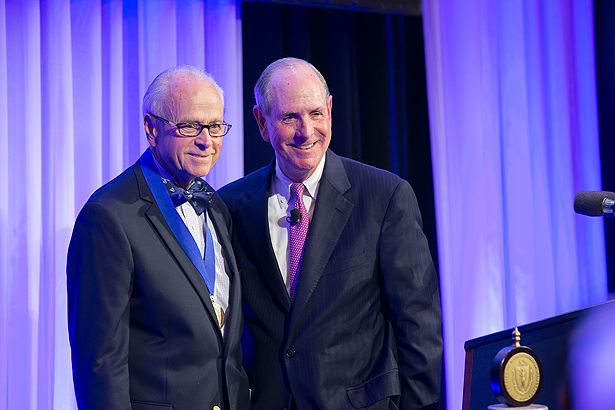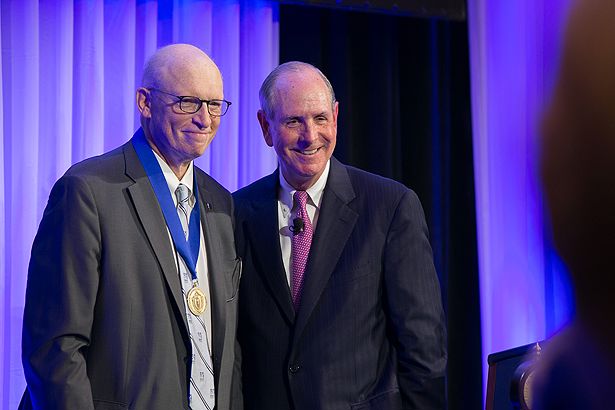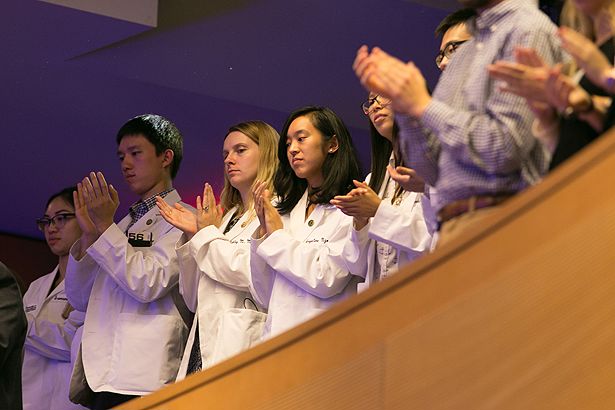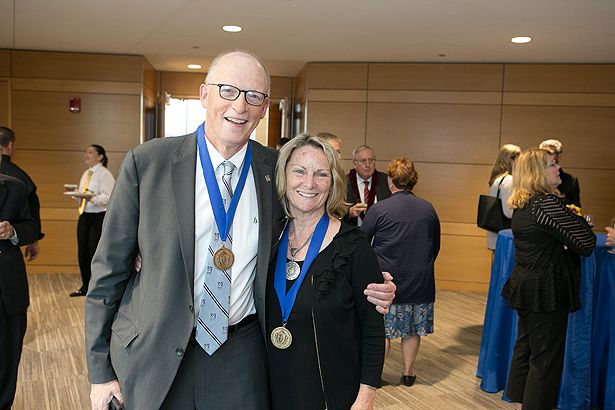In his annual Convocation address marking the start of the academic year, Chancellor Michael F. Collins applauded the campus for its uniquely collaborative environment that propels faculty, staff and students to achieve scientific breakthroughs, run highly regarded educational programs and manage remarkable health care delivery enterprises.
“The open and collaborative culture at our medical school is quite rare in higher education; rarer still at medical institutions,” said Chancellor Collins, to a packed audience in the Albert Sherman Center auditorium. “We experience a dynamic combination of smart minds, great science and genuine collegiality that sets us apart.
“Our unique culture catalyzes surprising and seminal advancements, including a Nobel Prize and a Breakthrough Prize; the highest medical student satisfaction among American medical schools five years running; innovative health care delivery enterprises across our clinical partners—all making us a place that is highly rated and deeply admired by leading scientists, health leaders and educators around the world.”
Collins said UMMS has become “the emblem of the next generation global medical school.”
See Chancellor Collins’ full speech.
See a video of the Convocation Ceremony.
The highlight of the chancellor’s accolades accompanied the awarding of Chancellor’s Medals to four distinguished faculty for their exemplary teaching, scholarship, clinical excellence and service at UMass Medical School.
Anne Gilroy, MA, associate professor of radiology, received the Chancellor’s Medal for Distinguished Teaching. As recipient of the recognition, Gilroy will receive the Manning Prize for Excellence in Teaching, a $10,000 gift made possible through the generosity of Donna and Robert J. Manning, chairman of the UMass Board of Trustees.
“For 28 years, you have taught anatomy to our medical students. But, your contributions to the education of our learners extend far beyond that one course and the borders of our campus,” Collins said, presenting the medal to Gilroy. “In fact, you have been described as an ‘institution within an institution.’ Your textbook and atlas of anatomy are renowned the world over; actually described as bringing ‘miracles’ to learning by some who have used them to master your art. Much like a talented painter, you bring focus and clarity to a subject that revels in the beauty of the body and reveals its intricacies only through a mastery facilitated by great teaching.”
Robert H. Brown Jr., DPhil, MD, the Leo P. and Theresa M. LaChance Chair in Medical Research and chair and professor of neurology, received the Chancellor’s Medal for Distinguished Scholarship.
“The impact and significance of your work is known throughout the world,” Collins told Dr. Brown. “You have been described as the world’s leader in ALS research, having made seminal discoveries in this field of inquiry. Your laboratory was responsible for the discovery of mutations in SOD1 as a cause of familial ALS; this set the stage for remarkably fruitful work uncovering other genes that contribute to ALS and ALS overlap syndromes. What is most impressive is that after discovering these mutations, you have gone on to develop a deeper understanding of the mutation’s biology . . . and now are developing two gene therapy strategies to silence the production of toxic RNA and proteins from the mutant gene C9orf72, the most common cause of inherited ALS.”
Robert Quinlan, MD, professor of surgery, received the Chancellor’s Medal for Distinguished Clinical Excellence.
“As a surgical oncologist who for decades has cared for the needs of women with cancer, you are widely known and respected across the region for your abilities to care for and about your patients,” Collins said, presenting the medal to Dr. Quinlan. “Your surgical expertise, when combined with a uniquely caring and personal touch, has brought calm and confidence to patients and family alike. Your career-long commitment to this community and its patients has wielded an influence like few others. You are beloved and trusted by your patients; you are respected and valued by your colleagues; you are genuine and comforting.”
Michael P. Hirsh, MD, professor of surgery,received the Chancellor’s Medal for Distinguished Service.
“You have been described as a role model for not just the science of surgery and the art of medicine but also for the humanistic qualities of being a physician, focusing on what is best for the patient and understanding how public health affects the human condition of individuals and the community,” Collins told Dr. Hirsh. “It has been said that Dr. Hirsh’s secret for being a revered teacher and public health advocate is no secret at all; he treats his patients, his residents and students, and his community co-workers with respect and as colleagues, and in so doing, models the art of being a holistic physician and person who demonstrates knowledge and generosity of spirit as he inspires those around him.”
Related story on UMassMedNow:
2017 Investiture Ceremony honors nine named professors and their benefactors
